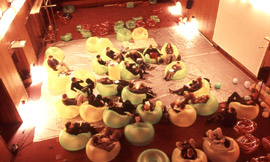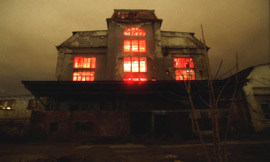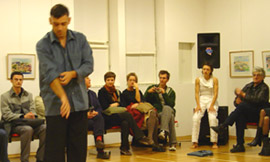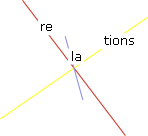|
|



Formatspoltical platform, lectures, debates, symposia, interdisciplinary cooperation, performances, international curatorial collaboration, website, publicationsProject leadershipGoran Sergej Pristaš (CDU), Tomislav Medak (mi2), Damir Blažević (Platforma 9,81), Sabina Sabolović (WHW), Boris Bakal (Bacači sjenki), Vesna Vuković (BLOK), Aleksandar Batista Ilić (Community Art), Olga Majcen (Kontejner)TeamIvana Ivković (Project co-ordinator);CDU: Una Bauer, Ivana Ivković; mi2: Željko Blaće, Teodor Celakoski, Ružica Gajić-Guljašević, Petar Milat, Nenad Romić, Emina Višnić; Platforma 9,81: Dinko Peracić, Marko Sančanin, Ana Šilović, Miranda Veljačić, Josipa Križanović; WHW: Ivet Ćurlin, Ana Dević, Nataša Ilić; Bacači sjenki: Katarina Pejović, Sonja Leboš, Mirko Bogosavac; BLOK: Dea Vidović, Sonja Borić, Miroslav Jerković; Community Art: Ivana Keser, Karmen Ratković, Tanja Vrvilo; Kontejner: Sunčica Ostoić Other partners"Zagreb - Cultural Kapital of Europe 3000" is being conducted within the framework of "relations" in cooperation with "Kontakt", the Arts and Civil Society Program of Erste Bank Group in Central EuropeOther supportersCity of Zagreb; Ministry of Culture of the Republic of CroatiaWebsite> Zagreb – Cultural Kapital of Europe 3000 |
"Cultural Kapital" is torn between the centrality of the respective capital cities and the transverse movement of capital, a phenomenon which is becoming increasingly evident in the internationalization of a cultural production that is continually losing its national characteristics. The communication exchange on a worldwide basis has radically changed the political economy of cultural representation. It is no longer a matter of presenting a representative, predominant culture produced within the borders of a nation-state to an abstract consumer of culture. Rather, individual subjects are connected with one another in specifically practical and theoretical fields, acting within the common context of a global economic production.In the transitional phase we must ask the question: who is the social agent of cultural capital?If this transition process means two things, namely, to surrender to market forces and to abandon social projects - or better the social as a project - then its most conspicuous effect is that the private interests of those involved in managing the public domain evade democratic controls and are no longer transparent. The tangible absence of social legitimization is mirrored in the mismanagement of public resources. Our ossified institutional culture and the system of public support dependent on it demonstrate how maintaining the status quo can sometimes amount to leading the way in this process of privatization of public interest. The sole motor of change in relations between the state and statesupported institutions is currently the dynamic generated by individual interests. Of particular significance here are the independent actors who understand and re-articulate cultural activities as social action and social activities in terms of critical culture. The platform "Zagreb - Cultural Kapital of Europe 3000" has set itself the goal of strengthening collaboration between independent cultural initiatives which investigate the changed conditions of cultural and social praxis arising from the increasingly regional significance of ever-extending economic and communicational exchanges. In this context these initiatives are to work on reforming the institutional structures with the aim of increasing the presence of and fostering opportunities for independent culture. Since 2003, the platform has initiated a series of regional, international, and interdisciplinary collaborations which present and develop new group dynamics, new collective strategies, and new working forms in culture production. This step is aimed at counteracting the control over productivity exerted by copyright legislation and intellectual property and at supporting the protection of the public sphere against privatization. In addition, proposals are to be submitted as to how the independent cultural sector can be strengthened and developed, and how its presence within "cultural capital" can be secured. Just as it fosters collaboration, so too the platform is keenly interested in investigating and extending the conditions and possibilities of "collaboration" itself, for "cultural capital" no longer refers to infrastructures, but rather collaborations: indeed, collaboration is its infrastructure.The idea of cultural capital is out of jointThe cooperation/collaboration between the cultural actors, project partners, and the founding initiatives are to result from inherent needs and not prescribed obligations and rules. The "Center for Drama Art" (CDU) is to focus on two themes: firstly, the presentation of the new Croatian performing arts scene and how it operates within the context of a cultural policy increasingly geared towards prestigious representation; and secondly, the problematic issues of collaboration in performing groups and the significance of immaterial labor in artistic cooperation. The curators team "What, How and for Whom" (WHW) is also devoting its attention to the theoretical aspects of collective work in three projects. The projects "Bulletin Board" and "Collective Action" are to illuminate this topic historically as well as theoretically through discussions, lectures, exhibitions, and art actions. In addition, collaborating with the "Center for Drama Art" and "Platforma 9,81," WHW has organized a symposium entitled "Group Dynamics." Another focal point of WHW's work is international curatorial collaboration. Together with Swedish curators, WHW is undertaking a study, entitled "Normalization," about how the term "normality" is undergoing shifts of meaning in the "post-transitional period" in Croatia. "Platforma 9,81" is to initiate two projects, working outside the habitual practices of mainstream architecture and urban planning. "Invisible Zagreb" investigates the potential cultural and public use of empty city spaces. In workshops, discussions, and public presentations, "3D Journal: No1 - Capital Space" studies the impacts processes of social and economic transformation are having on architecture and urban development in Croatia.The "Multimedia Institute [mi2]" tackles the issues of how private economic structures and established intellectual processes are infringing on the public domain and tightening control over public interaction. The project "OutInOpen" is attempting to breach the influence "capital" has on the public with strategies taken from communication and information technologies. The aim is to enable new and larger spaces for independent public interaction. "SystemHack()" documents in an art exhibition actions that have managed to penetrate into and crack open closed systems, whether it be a copyright system, a surveillance system, or a system of beliefs. Together with the project partners WHW and CDU, the project "Public Domain and Creative Labor" will organize conferences, lectures, and exhibitions focusing on the themes of new licensing models for art and the management of immaterial labor. The project Swarm Intelligences is founded on the idea of uniting the intersections between the partners: the "Local Base for Culture Refreshment" (BLOK), the "Multimedia Institute [mi2]" (its theory module pastforward) and "Platforma 9,81" in partnership with Community Art. The emphasis of the project lies in the collaboration of different types of "intelligence in space," meaning different types of treatment and behavior according to prearranged social space: these are the intersections of architectural-urban planning, artistic-organizational, and theoretical rationality. "Zagreb - Cultural Kapital of Europe 3000" |
